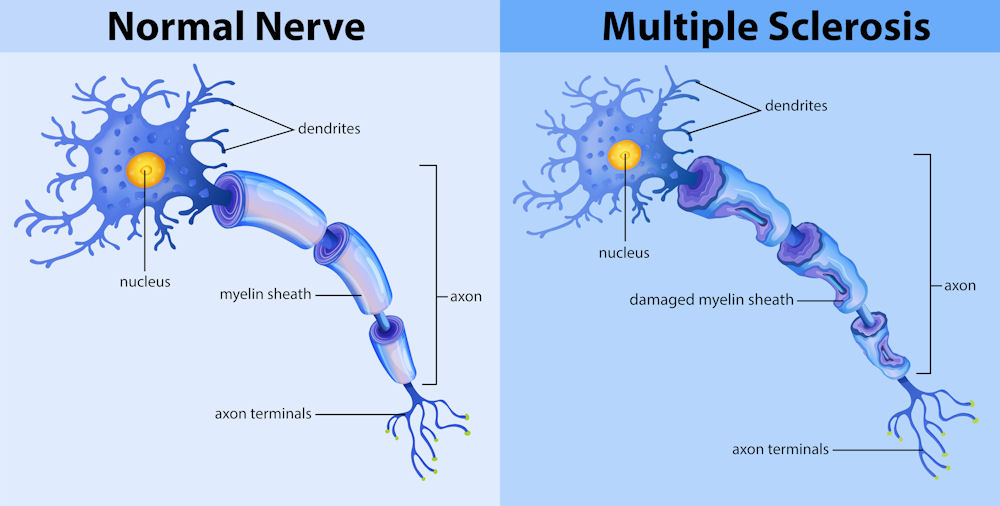Studies have examined possible links between substance abuse and the development or progression of MS, but there is no definite evidence that drug abuse directly leads to multiple sclerosis. Still, certain factors and observations should be considered, such as:
- Immune system effects: Some drugs can affect the immune system. Because MS is an autoimmune disease, any substance that changes immune functioning could contribute to disease activity. However, this doesn’t mean drug abuse caused MS, but it could worsen the existing condition.
- Symptom management: People with MS might depend on substance abuse to cope with MS symptoms such as pain, anxiety, or depression. This is a potential consequence of living with a chronic illness, not a causal connection.
- Limited research data: Research specifically studying the causal relationship between MS and drug abuse is limited. More studies are necessary to make a definitive conclusion.
At Northern Illinois Recovery Center, we understand that alcohol and MS have a coexisting relationship. We provide our clients with comprehensive treatment plans to help break the dangerous cycle of addiction.
The progression of multiple sclerosis varies greatly from person to person. Some people experience a gradual worsening of symptoms, while others experience periods of remission and relapses. Symptoms of MS include:
What is Multiple Sclerosis (MS)?
MS is a chronic, unpredictable neurological disorder that affects the central nervous system. It is distinguished by the individual’s immune system mistakenly attacking the myelin sheath, the protective covering of nerve fibers. This disturbs the communication between the brain and the rest of the body. Although the exact cause isn’t known, it’s believed to be a combination of environmental, genetic, and immune factors.
The progression of multiple sclerosis varies greatly from person to person. Some people experience a gradual worsening of symptoms, while others experience periods of remission and relapses. Symptoms of MS include:
- Fatigue
- Numbness
- Tingling
- Mobility problems
- Vision problems
- Cognitive issues

Effects of Alcohol on Disease Progression
It’s not yet clear what effect alcohol has on people with MS. Alcohol affects people differently, whether they have MS or not. Generally, experts recommend not consuming alcohol excessively, but those who wish can try a small amount if they’re comfortable with it.
MS patients are known to have an increased risk of suicidal thoughts and mood disorders. Even though these are usually associated with alcohol disorders, the drinking habits of MS patients haven’t been studied well. However, the results of a study of the drinking patterns of 140 MS patients indicated that 1 in 6 patients drink to excess and have a higher lifetime prevalence of anxiety, suicidal ideations, substance abuse, and a history of mental illness in the family, Healthcare providers should be aware of the potential for problem drinking in MS patients and how it can complicate the progression of the disease.
Alcohol and MS: What’s the Connection?
If you have problems with thinking, balance, or memory symptoms of MS, it’s probably best to avoid alcohol completely. Alcohol can also cause sleep problems and make bladder symptoms worse. The consumption of alcohol weakens the immune system. Any substance that weakens the immune system can promote disease progression.
Can Alcohol Worsen MS
Consuming alcohol can also worsen mood disorders like depression and anxiety, which are common in people with MS. It can increase the risk of suicidal thoughts, also a concern for people with MS. For people with Multiple Sclerosis, alcohol can worsen symptoms such as:
- Frequency and urgency of urination–alcohol is a diuretic, meaning it worsens urinary issues, including incontinence
- Thinking
- Coordination
- Balance
There is also the risk of other conditions that can arise from drinking alcohol, especially if you drink too much. There is an increase in the potential risk for:
- Certain cancers
- Stroke
- High cholesterol
- Vision problems
- Heart problems
- Liver disease
Some of these alcohol-related conditions may also worsen the symptoms of MS.
Alcohol can also interact with MS medications used to treat pain, headache, depression, and insomnia. This interaction affects how they work and may increase the possibility of harmful effects like liver damage. Combining these medicines with alcohol may lead to extreme sedation and health risks.
Understanding Alcohol Addiction
Alcohol addiction or alcoholism is also known as alcohol use disorder (AUD). It’s a medical condition characterized by the inability to stop or control alcohol use, despite negative occupational, social, or health consequences. AUD involves a recurring pattern of alcohol use that includes craving, loss of control, and physical dependence.
Healthy Alcohol Alternatives
Living with MS involves making choices that support your overall health. Alcohol can worsen MS symptoms or interact with medications. Non-alcohol alternatives to consider include:
- Sparkling water with fruit: Try infusing sparkling water with slices of cucumber, lemon, lime, or berries to make a hydrating and refreshing drink
- Herbal teas: Investigate herbal teas such as chamomile, ginger, or peppermint, which can be enjoyed hot or cold.
- Kombucha: Kombucha is a fermented tea with a unique flavor and even possible probiotic benefits. Try to choose low-sugar alternatives.
- Mocktails: Be creative with non-alcoholic versions of classic cocktails. You can find recipes online and customize them to your taste.
- Fruit juice: Choose 100% fruit juices or blend them together for a vitamin-rich, refreshing drink.
- Infused water: Add herbs, fruits, or vegetables to still water for a slight flavor boost.
Tips for Socializing
- Bring your beverage and make enough to share.
- Request mocktails. Many restaurants and bars will create mocktails upon request.
- Focus on people. The social feature of going out is more important than the drink itself.
- If it’s comfortable for you, let family and friends know you’re opting out of drinking alcohol.
March is Multiple Sclerosis Awareness Month and Brain Injury Awareness Month

Each March, a variety of MS Awareness Month events occur. You can show support by wearing orange, participating in events, and learning about the condition. Although almost 3 million people globally live with multiple sclerosis, many people don’t understand its complexity. The goal of MS Awareness Month is to change that and provide support to people living with the condition. Along with people living with MS, MS Awareness Month benefits their families and their communities.
March is also a special month dedicated to increasing awareness about brain injuries. The Brain Injury Association of America, established in 1980, aims to educate, advocate, and draw attention to the challenges faced by people with brain injuries. The official color for brain injury awareness is green (blue is sometimes used), although green is specifically associated with traumatic brain injury (TBI). The upcoming Action for Brain Injury Week (ABI Week) will occur from May 19 to 25, 2025.
World MS Day
World MS Day, which began in 2009 and occurs on May 30 every year, offers opportunities to get involved in the MS awareness movement. The 2025 campaign’s name is “My MS Diagnosis.” This campaign advocates for early and accurate diagnosis for people living with MS. It highlights the worldwide barriers to diagnosing MS and increases awareness by sharing real stories and information.
Recommendations for Managing Multiple Sclerosis
Living with MS presents challenges, but the right strategies and support can help you manage your symptoms and improve your quality of life. Here are a few recommendations:
- Keep your regular appointments with a neurologist specializing in MS. This is imperative for monitoring disease progression and adjusting treatment.
- Stick to your prescribed medication regimen and talk to your doctor about any concerns or side effects.
- Consider taking part in clinical trials for new MS therapies and treatments.
- Work with your medical team to develop a plan to manage specific symptoms such as pain, fatigue, and muscle spasticity.
- Get adequate sleep and rest to fight fatigue, a common symptom of MS.
- Eat a nutritious and balanced diet to support your overall health.
- Take part in physical activity and gentle exercise to maintain your strength and flexibility.
- Practice stress-reducing methods such as deep breathing, meditation, and yoga.
Treatment for Alcohol Addiction

Treatment approaches for AUD include:
A medical detox is typically the first step in treating alcohol addiction. It involves safely managing the withdrawal symptoms that begin when a person stops consuming alcohol. Detox is usually conducted in a medically supervised setting to ensure safety. Withdrawal from alcohol can be extremely unpleasant and potentially life-threatening. The duration of detox depends on the severity of the individual’s addiction.
Evidence-based behavioral therapies have been proven to be effective in treating addiction. They play an important role in addressing the psychological aspects of AUD. Cognitive-behavioral therapy is the most commonly practiced approach.
Working with a trusted therapist, one-on-one or in a group setting, helps people discover underlying conditions and receive peer support.
Medication-Assisted Treatment (MAT) combines medications with a therapeutic approach. There are several medications approved to help reduce alcohol cravings and prevent relapse.
Find Substance Abuse Treatment in Illinois
If you or a loved one is suffering from AUD, Northern Illinois Recovery Center offers accredited, experienced help. We will help you design a personalized treatment plan specifically to meet your needs and requirements. Our medical professionals will also work with you to manage any co-occurring medical needs you may have.
Our programs include detox, residential, and three levels of outpatient care. It is time to focus on your health. NIRC can show you how you can go on to live your best life. All you have to do is contact us. The choice is yours.




